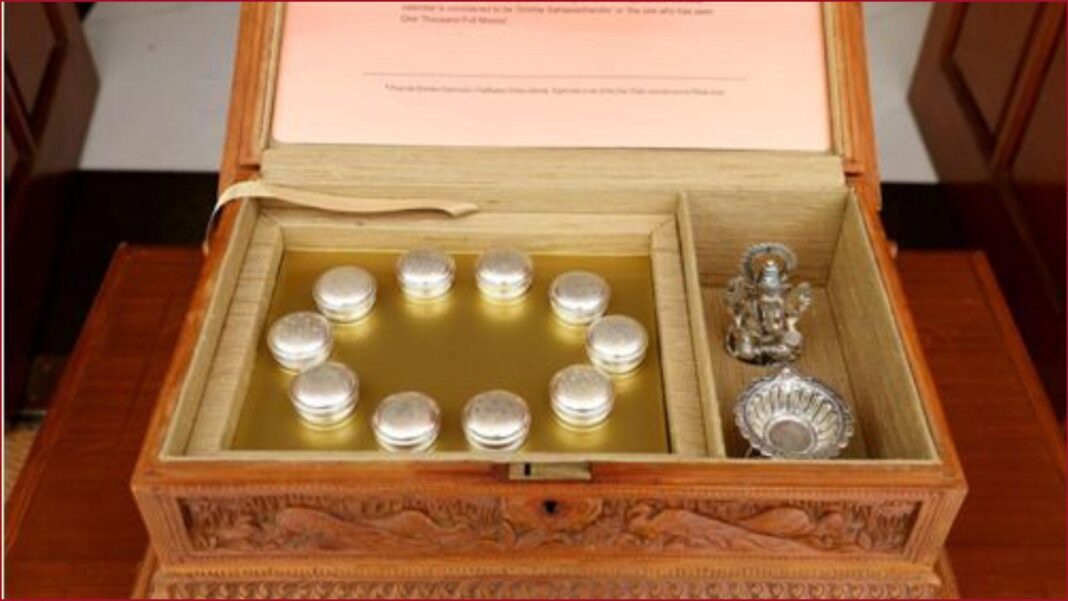During his state visit to the United States in late June 2023, Indian Prime Minister Narendra Modi presented several gifts to U.S. President Joe Biden and first lady Jill Biden. Among those were the “10 danas,” items with symbolic importance in Indian traditions. I study these traditions in my work as a scholar of Hinduism, Jainism and Buddhism. Each of the danas is believed to have an auspicious meaning.
The 10 danas are (1) til, or sesame seeds; (2) a gold coin; (3) a cow, though Biden received a silver image of a coconut as a substitute; (4) a piece of land, in place of which Biden received a piece of fragrant sandalwood; (5) ghee (clarified butter); (6) cloth – for which Biden received a piece of silk; (7) long-grained rice; (8) a piece of jaggery, a very sweet brown sugar made in India from palm tree sap; (9) a silver coin; and (10) some salt.
What does each substance represent?
Sesame seeds are a symbol of immortality. According to a story in the Puranas, or books of ancient lore about the Hindu deities, during the churning of the ocean, the sweat of Hindu Lord Vishnu dropped to the Earth in the form of sesame seeds. The churning of the ocean was an event, famous in Hindu literature, in which the devas, or deities, and the asuras, or demonic beings, joined forces to acquire a life-giving substance called amrita that had sunk to the ocean floor. This required great exertion, especially on the part of Lord Vishnu, who transformed himself into a giant tortoise to play his role in the process.
Gold is considered purifying and also is symbolic of wealth and prosperity.
The cow is a symbol of life and of nurturing. The substitution of the silver image of a coconut for an actual cow reflects a common Hindu ritual in which an actual coconut is used in a ceremony to substitute for some other object that is unavailable or that would be impractical to include.
The gift of a piece of land also represents wealth. Traditionally, the gift of an actual piece of land is something one could draw upon in times of financial difficulty. It could be cultivated, rented out, and so on.
Ghee, or clarified butter, is an element in Hindu rituals going back to at least the second millennium B.C. It represents both nourishment and healing.
Cloth represents financial security: one’s ability to obtain the necessities of life, such as decent clothing.
Rice, in India, has long been a symbol of fertility. The ability to grow rice has been vital to life in most of India since before recorded history.
The sweetness of the jaggery represents good news. Giving it represents a hope that one will receive good news and hear auspicious things in the years ahead.
Silver is connected with the Moon in Hindu symbolism – as gold is connected with the Sun. The gift of silver is a wish that one will have good dreams and undisturbed sleep.
Finally, salt is a symbol of Lakshmi, the goddess of prosperity. Like salt, she is said to have emerged from the ocean. Salt thus represents lifelong prosperity.
The 10 danas are given to someone who has seen 1,000 full moons, or “sahasra chandra.” This is an ancient practice first described in a set of texts called the “Grihya Sutras,” which date from roughly 500 B.C. These sutras, or authoritative texts, describe household rituals and regulations. The practices they enjoin are rooted in the culture of the Vedas, the oldest sacred literature of Hinduism.
The full moon is an auspicious symbol in many Indian traditions. The full moon day, or Purnima, of each month is a time when many people engage in religious observances. The full moon day is the culmination of the “bright half,” or the shukla paksha, of each month in the Indian lunar calendar. The bright half is the roughly two-week period during which the Moon is waxing, and is seen as a better time to undertake any important activity. Seeing the full moon is an auspicious act, so having seen a thousand full moons is a particularly auspicious and noteworthy event in one’s life.
The ceremony is typically performed for someone who is between the ages of 81 and 84, though Modi gave the 10 gifts to Biden on the occasion of his reaching the age of 80. Giving these gifts amounts to congratulating the recipient for having lived a long life – itself a sign of virtue and wisdom – and wishing continued good luck, health and prosperity.
This article is republished from The Conversation, an independent nonprofit news site dedicated to sharing ideas from academic experts. The Conversation has a variety of fascinating free newsletters.
Read more: Nonbinary genders beyond ‘male’ and ‘female’ would have been no surprise to ancient rabbis, who acknowledged tumtums, androgynos and aylonot Behind Modi: The growing influence of the India lobby
Jeffery D. Long does not work for, consult, own shares in or receive funding from any company or organization that would benefit from this article, and has disclosed no relevant affiliations beyond their academic appointment.














